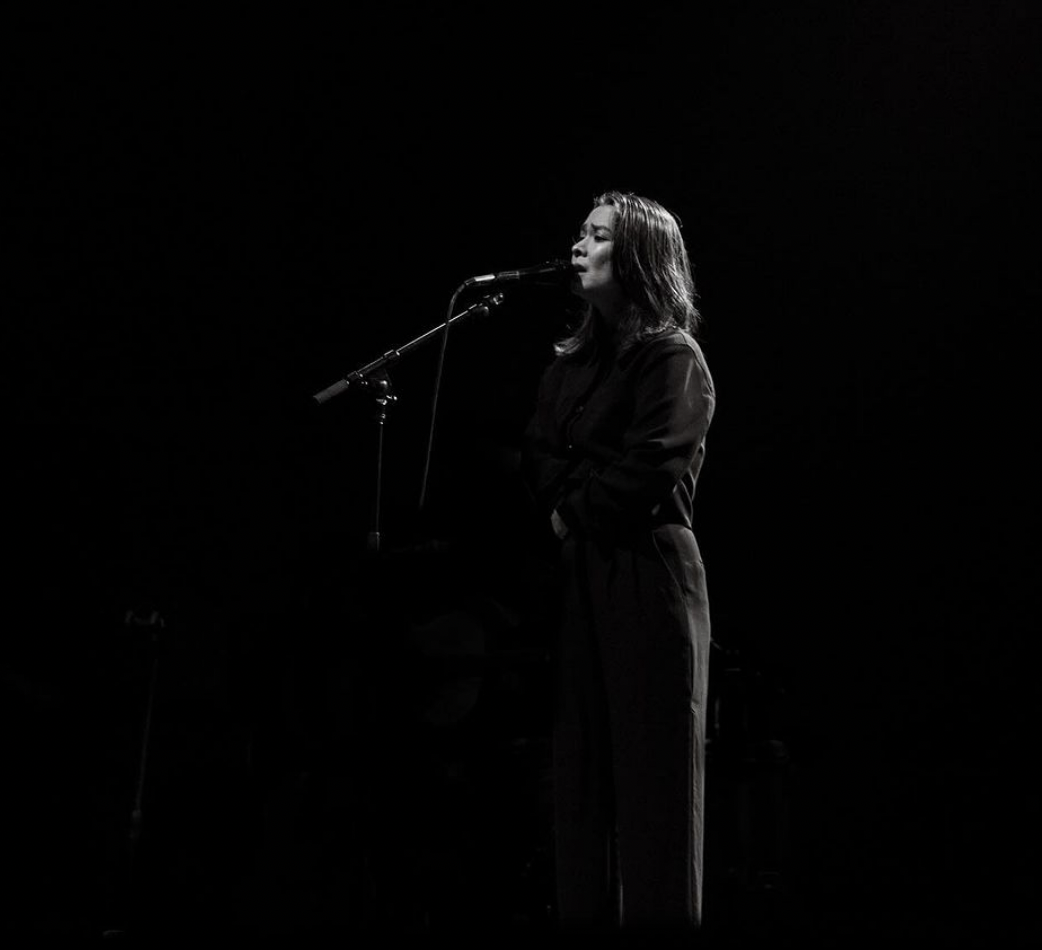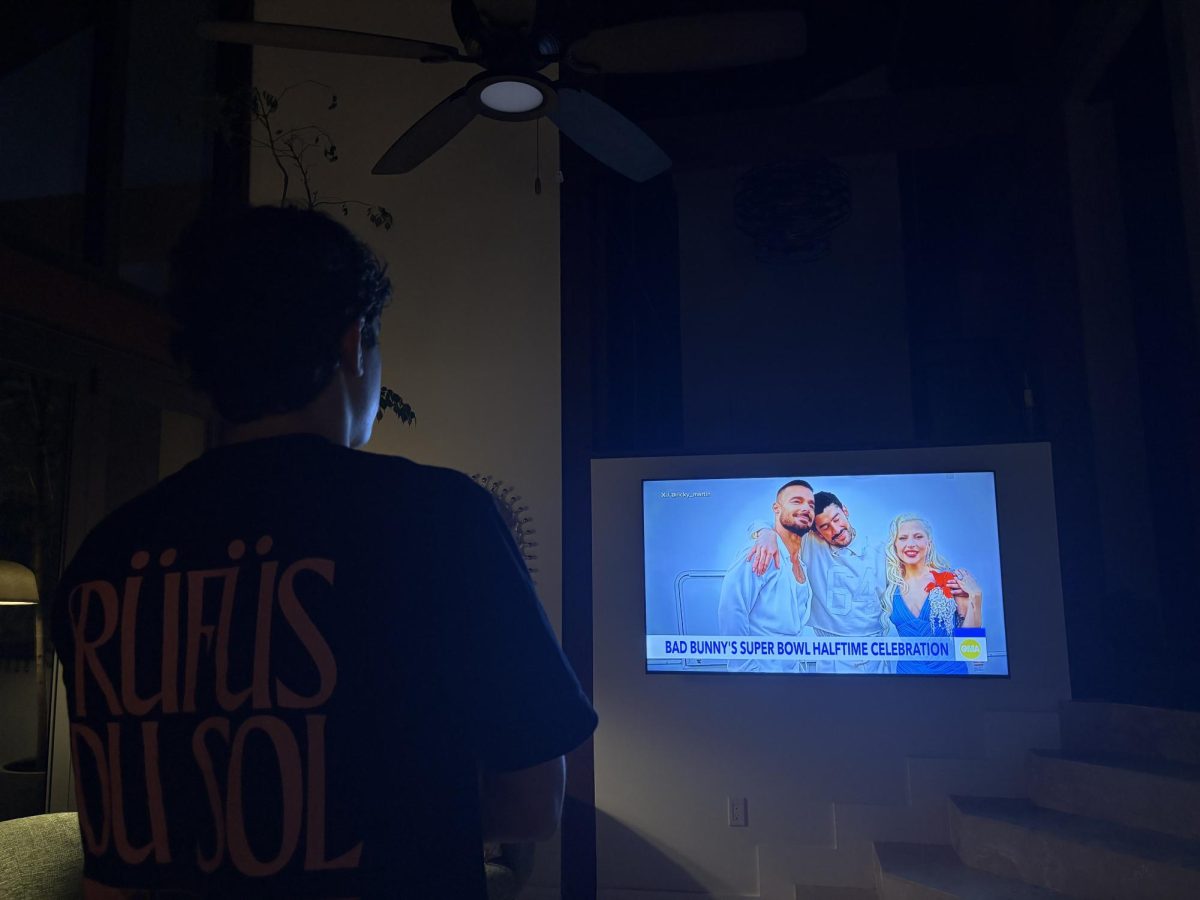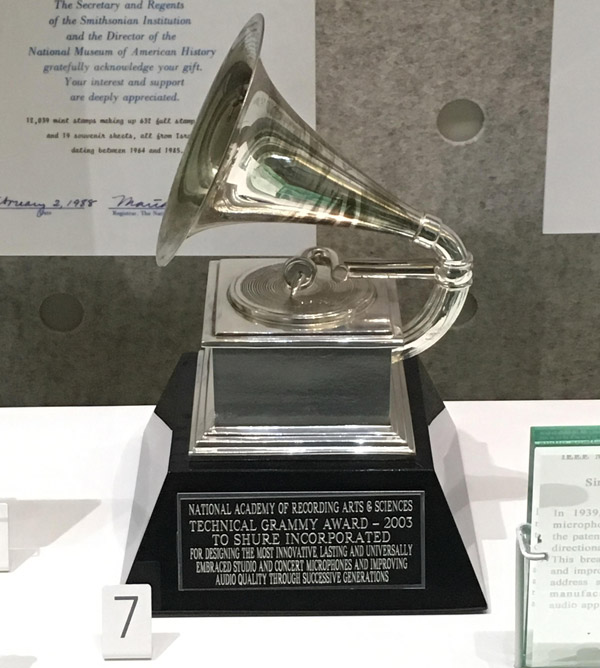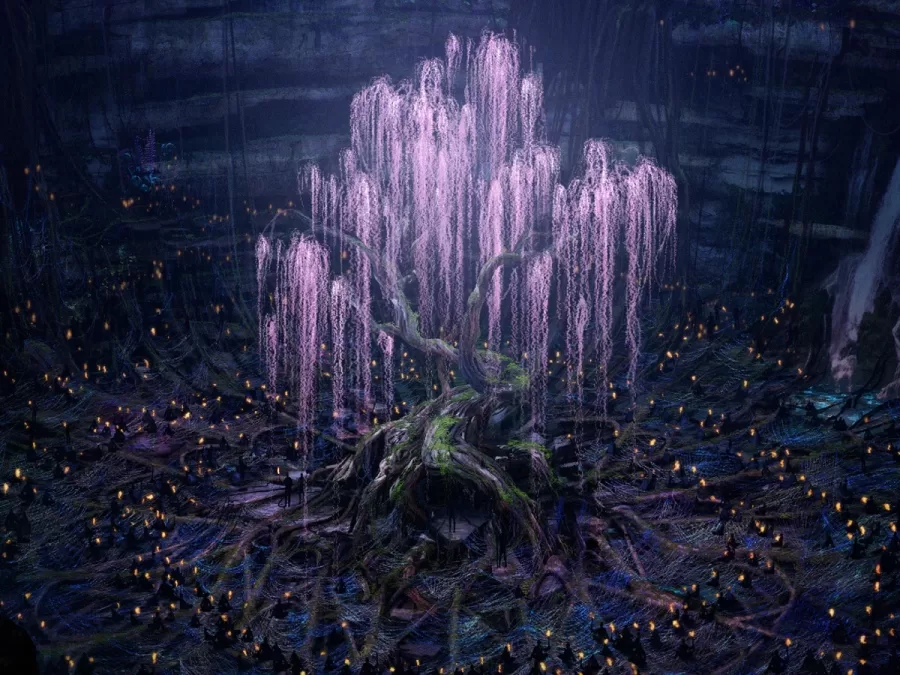On September 27, 2023, indie singer-songwriter Mitski Miyawaki (most well known as just “Mitski”) released her highly anticipated album The Land is Inhospitable and So Are We (oftentimes shortened to simply The Land). Being her newest release since her disco-inspired Laurel Hell in 2022, many fans were thrilled to see what direction The Land would take. One thing about Mitski is that she is a juggler of many genres all while staying true to her individual unique style, sparking an exciting curiosity with every song she releases. The album has led to Mitski surpassing artists such TV Girl, My Chemical Romance, Elton John, and Steve Lacy, offering a compelling assortment of songs that highlight Mitski’s creative growth through her distinctive blend of vulnerability and unadulterated skill. Deeply personal and undeniably beautiful, this album gives listeners a first-row view of the inner workings of Mitski’s mind.
“I’ve never listened to any other one of (Mitski’s) albums but I thought this one was good,” said sophomore Ernesto Losada. “My favorite song was “My Love Mine All Mine.” That’s all I have to say.”
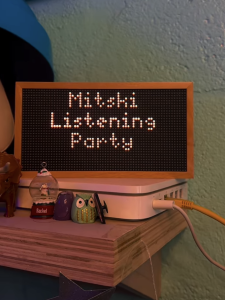
The week before the album’s release, Sweat Records hosted a pre-release listening party. I was lucky enough to attend with a close friend of mine (who is equally as big of a Mitski fan as I am, if not bigger), getting a first scoop of the album before its official release.
“I wonder how many people will be crying,” pondered my friend, Sara Ruiz-Meza, as we RSVP’d for the event.
Zacharie Mantha-Ware is the social media/community outreach coordinator at Sweat Records. Working for Sweat Records since February, Zacharie started out as an avid customer with an affinity for collecting records. Additionally, he has also been a Mitski listener since her 2016 release Puberty 2. He was gracious enough to give the Royal Courier a look into the process behind these listening parties from the perspective of an organizer.
The organization of these listening parties is typically a quick process. On most occasions, hosts are alerted a week or two ahead of time before they start the process. “Album parties consist of talking with the labels, organizing the advertising, making sure the store looks cute with some related decorations, and prepping the giveaway stuff the label sends,” Mantha-Ware explained.
It was a very intimate setting and it felt very uniting to be in a room full of people who are equally as thrilled to experience the album as you are. It really goes to show you don’t need to blow hundreds of dollars on concert tickets to share the experience of loving an artist alongside other fans. “It was so awesome seeing everyone chill and listen to it. It seemed it was enjoyed throughout and pretty much everyone stayed for the second listen,” expressed Mantha-Ware. “It’s so awesome to experience the album for the first time with fans.”
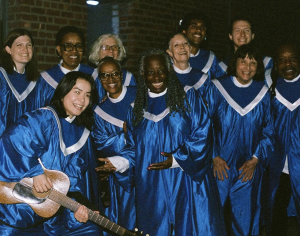
The album opens with “Bug Like An Angel,” which was the first song released from the album as a single. “Bug Like An Angel” tells the story of a regretful alcoholic who finds a bug at the bottom of their empty glass, opening with the verse “There’s a bug like an angel stuck to the bottom / Of my glass, with a little bit left / As I got older, I learned I’m a drinker / Sometimes, a drink feels like family.” The song is slow and minimalistic with little to no instrumental to accompany Mitski’s voice, until all of a sudden she is joined by a large choir, filling the listener’s ears with a full sound. The usage of this gospel-like sound is a fantastic choice to combine with her lyrics, most of which contain religious themes (such as “When I’m bent over wishin’ it was over / Makin’ all variety of vows I’ll never keep / I try to remember the wrath of the devil / Was also given him by God”). This song also introduces the bug symbolism that is often shown throughout the album. While this song was received with very mixed reviews from fans, I believe it provides a lovely opening to the album, setting the mood efficiently. Additionally, I also don’t believe all songs have to be fully listenable to be considered good music– this song is beautiful when looked at through the lens of it being a work of art rather than something you can dance or sing along to; while it isn’t a song that many would go out of their way to listen to, it serves as evidence to Mitski’s true mastery of her craft as an artist.
The pace picks up with the second song on the album, “Buffalo Replaced.” This song, while not very high energy, is a song that exhibits a sense of optimism and diligence (although described as blind); the topic of energy regained and dwindled is often noted within this album, and this song serves as a good opener to the hopeful side of the album, contrasting the mellow tone of the previous song. Additionally, the topic of industrial development is a possible subject in this song, though it’s difficult to tell whether it’s intentional. Cleverly described by Genius contributor @definitelynotisaac, “In the manufactured world, advanced technology eventually becomes obsolete (even the “freight train”). Mitski’s analogy, then, is making a larger point — Perhaps nature and industry aren’t so different after all. This lyric also could allude to nature (buffalo) being traded in for modernity & industry (freight train), but may not be intentional.” Overall, it’s a very beautiful song with a plethora of possible meanings.
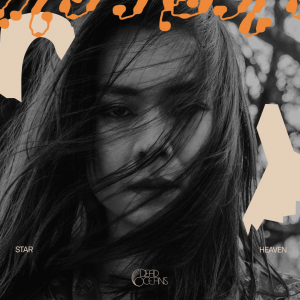
“Heaven,” the third song on the album, was the second song to be released as a single. “Heaven” has a very nice country ballad-like sound to it, which I’m quite a fan of. I heavily enjoy the folky sound that’s shown throughout this album, and this song serves as a nice introduction to Mitski’s usage of that sound. Additionally, this song evidently carries on the religious themes expressed in the first song, as noted by the title alone. The subject of this song appears to be a lost love, though it’s up to interpretation as to where said love has gone; it’s possible that the subject of the song has either left Mitski or has passed away, thus reaching Heaven. The repetitive usage of the title in the song’s lyrics could allude to this, but it also serves as symbolism to describe the bliss Mitski feels when intertwined with her partner. The feeling she gets from loving them and being loved by them is divine and otherworldly, and now she is left with mere remnants of her lover after they have gone.
Following “Heaven” is “I Don’t Like My Mind,” which juggles with the topic of internal conflict, which has remained consistent throughout Mitski’s discography. In this song, she sings about overindulgence (through blaring loud music, binge eating a whole cake, or overworking herself) in order to distract herself from the thoughts that consume her when she is left alone and forced to deal with them. However, she finds that her habits of overstimulating herself to distract from the inner workings of her mind often leave her feeling regretful. She has fallen into a cycle of bad habits which only fuel the awful thoughts in her mind, which only further sparks her need for a distraction and consequently fuels her unhealthy rituals. Circling back to the themes of capitalistic coercion emphasized in her previous album Laurel Hell, the song closes with the lyric “Please don’t take my job from me,” alluding to the idea of her feeling attached to her job due to its escapist nature, but also finding herself trapped within her own career.
“I thought that Mitski in this album was a mix of Lana Del Rey and Patsy Cline. She had that vibe,” explained Mrs. Lianne Rodriguez. “Most of her songs sound similar, but “Heaven” was a particular favorite of mine. I listened to that one the longest.”
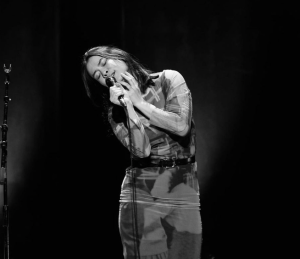
“The Deal” is the fifth song on the album, As shown in previous songs like this album’s “Bug Like An Angel” and Bury Me At Makeout Creek’s “Carry Me Out”, it is evident that Mitski is a huge fan of sudden booms of filling noise amidst otherwise simplistic songs, and this song is clear a testament to her usage of sudden contrasts in volume. This song is comparable to the Faust Myth, a tale of a man who makes a deal with a demonic force in exchange for an advantage; however, in “The Deal,” Mitski doesn’t intend to get rid of her soul in order to get something in return… She simply wants her soul out of her hands. When having to manage overly intense emotions, one might find it simpler to simply get rid of them as a whole. Mitski wishes to free herself from the burden and pain that her soul has caused her, thus leading her to make the deal she sings of. Her usage of the aforementioned contrasting volumes between the chorus and verses is a beautiful method of providing emphasis on the urgency to get rid of all emotions. Following the chorus, Mitski sings “Then, of course, nothing replied, nothing speaks to you in the night / And I walked my way home, there was no one in sight,” demonstrating that there was no one willing to accept her deal, finding herself isolated yet again. However, “perched upon a streetlight” is a bird, representing her soul. The bird warns Mitski that though the absence of her soul will free her from pain and despair, it will also strip her of joy and happiness. As the song comes to an end with the repeating lyric “There’s a deal that I made,” the instrumental morphs from a beautiful string harmony to this almost messy percussion sound, drowning out Mitski’s voice– this could represent the regret she makes following this deal, finding that she has thrown herself into deeper anguish instead of getting rid of it as a whole.
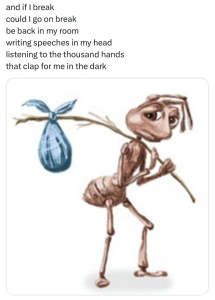
Marking our halfway point is “When Memories Snow.” It’s one of the shorter tracks on the album, but arguably one of the most impactful to me (despite the fact it is the second least streamed song on the album at roughly 3,500,000 listens on Spotify as of October 2023). This song felt straight out of the aforementioned Laurel Hell, sharing the common theme of desperately needing to find a moment to take a break amidst her busy and emotional life, finding herself overwhelmed with the thoughts of her past. Starting with a simple chordal piano instrumental, the song opens with a description of shoveling memories, like snow, out of a driveway; pushing all problems to the side, Mitski chooses to go about her life ignoring the issues of her past traumas in order to continue living in willing ignorance despite her turmoil. However, she finds her snow-like memories melting and “drippin’ through the downspout,” as they welcome their way back into Mitski’s life yet again. Finding herself overwhelmed with emotion, she sings what I consider one of the most impactful lyrics in the album: “And if I break / Could I go on break?”.
The most popular track on the album is the seventh, titled “My Love Mine All Mine.” This song, while being unlike anything I typically choose to listen to, was the song I listened to the most upon the album’s release (I listened to it a good 150 times in three days alone). While every other song on the album has around 3,000,000-7,000,000 listens on Spotify, this song is about to hit 40,000,000 streams and is currently Mitski’s most popular song on Spotify, surpassing some of her greatest hits (such as Be The Cowboy’s “Washing Machine Heart,” Bury Me At Makeout Creek’s “First Love/Late Spring,” and Puberty 2’s “I Bet on Losing Dogs”). This song strongly reflects Mitski’s new artist statement, in which writer Will Arbery explains that “Sometimes Mitski feels life would be easier without hope or a soul or love. But when she closes her eyes and thinks about what’s truly hers, what can’t be repossessed or demolished, she sees love”. Throughout the many stages of grief Mitski goes through in this album, this song is most akin to a cathartic feeling of acceptance. She has accepted the overwhelming amount of emotion she feels and, instead of finding it a burden, has found it to be something beautiful. The love she has in her soul is the only thing in the world that truly belongs to her; thus, after she is long gone, she wishes for all this love to live on through the moon.
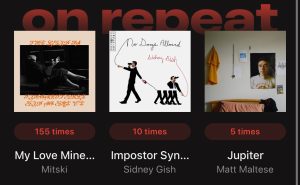
“Being someone in a relationship, the way I interpreted “My Love Mine All Mine” was being able to affirm that, despite all the uncertainty in the world, one thing we can control is how and when we love, and how powerful that is,” mused ILS alum Caitlyn Gil.
The eighth song, “The Frost,” is one of my personal favorites. It has a very evident folk-inspired sound, similar to “Heaven”. This song feels like the sister to “When Memories Snow,” harboring the same symbolism of snow representing her past as well as the consistent theme of isolationism. The absence of people around her leads to an absence of warmth, leaving her feeling cold and alone. In the second verse, she sings “You’re my best friend, now I’ve no one to tell,” seemingly calling back to a lyric on Laurel Hell’s “Should’ve Been Me,” in which she sings “Well I went through my list of friends and found/I had no one to tell.” She mourns the loss of familiarity, finding an overwhelming feeling of pain that only grows when she realizes she has no one to confide in about her problems. She wallows in her own despair, completely “witness-less”.
“Star” follows, which was released as a single at the same time as “Heaven” (which may be a nod to a lyric in Mitski’s song “Remember my Name” featured in the album Be The Cowboy, in which she says “Just how many stars will I need to hang around me / To finally call it Heaven?”). This song, to put it simply, is beautiful. It has a similar sound to Be The Cowboy’s “Pink in the Night,” offering a “stunning atmospheric slow-burn, reaching a shimmering apex as Mitski sings the chorus” (as beautifully phrased by Genius contributor PipM). In this song, Mitski compares a past relationship to a star; while it is far away and out of reach, it is something she can look back at fondly. While the love she describes is foolish and almost childlike, the blind excitement that comes from young love is something she can recall with joy rather than regret. No matter what distance lies between her and her past lover, they lay under the same stars and can look up and reminisce on what once was.
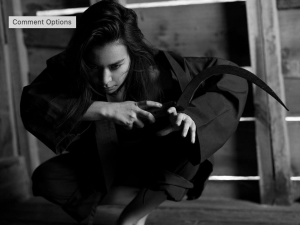
The tenth song on the album is “I’m Your Man,” which was an instant favorite of mine due to its usage of the dog motif (which is included in countless of my favorite songs, such as Sidney Gish’s “Imposter Syndrome,” boygenius’ “Me & My Dog,” and Car Seat Headrest’s “Beach Life-in-Death”). This song, unlike the previous one, reflects on a relationship that failed, leading to lifelong regret. “I’m Your Man” is a song filled with self-deprecation, in which Mitski sings about her mistreatment of a past lover. She compares her past lover to a dog– loyal, loving, and endlessly devoted– and Mitski is merely their man, mirroring the phrase “man’s best friend”. While her lover worshiped and loved her as one would a God, Mitski did nothing but destroy and sabotage. She expresses that she believes she didn’t deserve a love as angel-like as the one her past lover showed her; she is well aware that her treatment of said lover will result in well-deserved bad karma, where she will “meet judgment by the hounds”. The final line of the song is sung in response to “You believe me like a God,” to which she responds “I betray you like a man”. The last line of the song is followed by a minute-long instrumental, solemn and choir-like, accompanied by the barking of a seemingly distressed dog.
“I feel like I have to listen to that while it’s raining outside and I just went through a horrible breakup,” Mr. Nicholas Shaheen said.
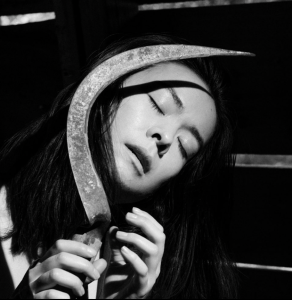
The album closes with “I Love Me After You.” While it shocks me to say this, this closer has the least amount of Spotify streams of all the songs in this album. Having a slow guitar sound that could similarly be found in her album Bury Me At Makeout Creek, this song is a beautiful closer. Following the pain and hardships expressed in this album, this song is a butterfly emerging out of its cocoon– Mitski has made the choice to leave her past relationship(s) behind and embrace change for her own sake. Contrasting the message in “My Love Mine All Mine” in which she expresses that the only thing she has true ownership over is the love she expresses, this song shows her taking back control over her life, crowning herself “king of all the land,” drawing a connection to the album title.
Overall, this album is a must-listen. While not fit to everyone’s taste, it is truly unique and deeply moving if given a chance. While many artists play with the themes in this album, it is difficult to say any of them could do it with as much skill as Mitski does. Gripping onto her listeners, Mitski lures you into her world and either offers you a perspective that you can deeply resonate with or a fresh, new point-of-view that is certain to enlighten you. There’s a reason her concert tickets sold out minutes after their release.


